If You See This Film Again Today You Ascertain
How Leni Riefenstahl shaped the style we run into the Olympics
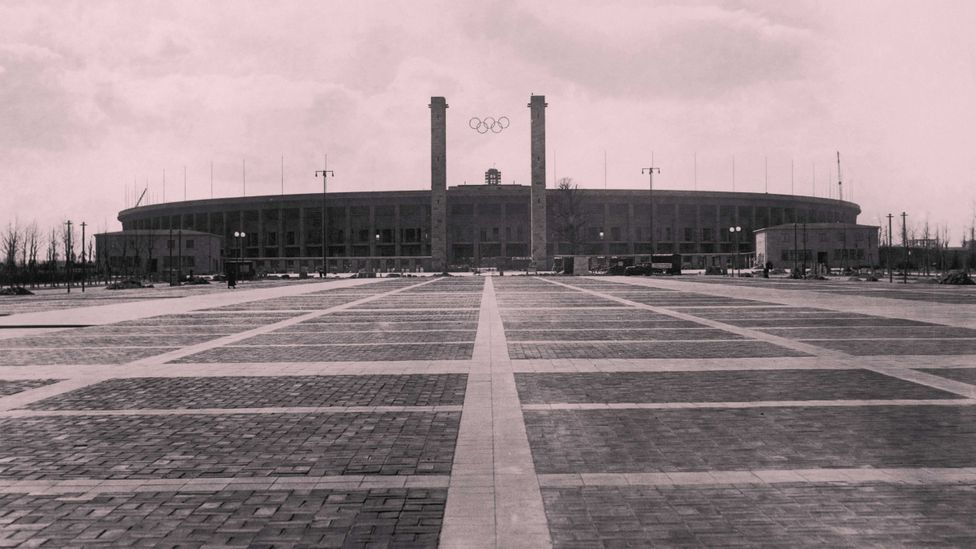
Is Leni Riefenstahl's Olympia Nazi propaganda – or the greatest film about sport ever made? Nicholas Barber takes a look.
I
In Stephen Hopkin's recent Jesse Owens biopic, Race, Owens (Stephan James) is well-nigh to compete in the 200m sprint in the 1936 Berlin Olympics, and Leni Riefenstahl (Carice van Houten) is about to film him, when Hitler's propaganda minister, Joseph Goebbels, insists that the cameras are switched off. He doesn't want the world to see Germany'due south fittest young Übermenschen beingness left in the dust past an African-American. But Riefenstahl doesn't heed. She is adamant that her Olympic documentary will exist a work of timeless truth and beauty, whether Hitler approves or not.
Is that really what happened? It's true that Riefenstahl's 2-office documentary, Olympia, includes Owens' victories over his Aryan competitors, and it's truthful that information technology was acclaimed equally a masterpiece that revolutionised the way sport was depicted on screen: in 1955, a mere decade after Globe War Two concluded, a group of Hollywood directors chose it every bit one of the 10 best films always made. Just picture palace historians even so fence whether Riefenstahl was defying Goebbels and Hitler, lxxx years ago this summer, or whether she was doing exactly what they wanted.
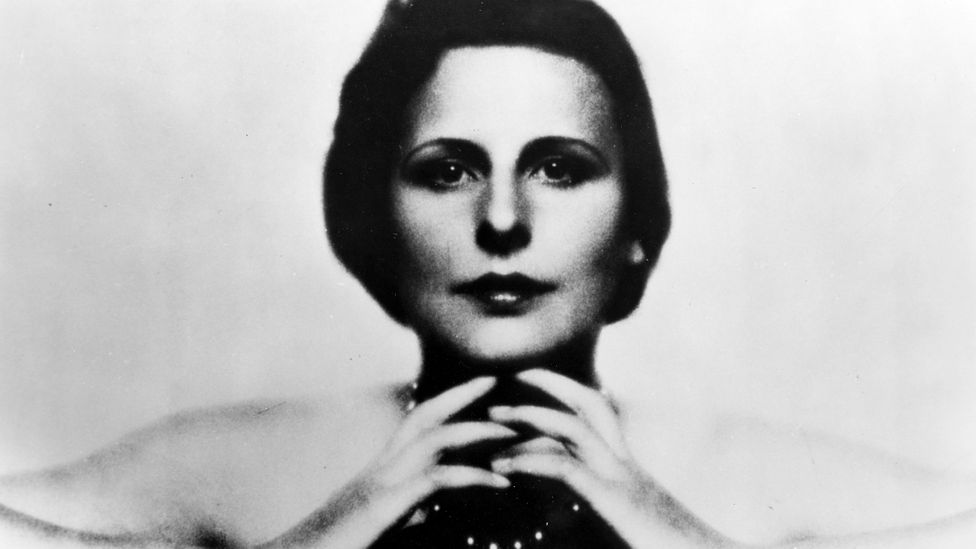
Leni Riefenstahl trained as a dancer and was an player in several hit films of the 1920s and '30s before she became a director (Credit: Alamy)
There's a lot less ambiguity about Riefenstahl'south previous film. Helene Bertha Amalie Riefenstahl's most famous achievement is Triumph of the Will, a horribly gripping business relationship of the Nazi Party'southward 1934 Nuremberg rallies. The picture is and then dynamic, then compelling, so grand and aggressive, that it ranked at number 19 in a 2014 Sight & Audio magazine poll of cinema'due south best documentaries. Information technology is also, on the other hand, a awe-inspiring piece of Nazi propaganda. Opening with a caption trumpeting "German rebirth", Triumph of the Volition goes onto imply that Hitler is nothing less than the godlike saviour of Federal republic of germany. Not that Riefenstahl ever admitted that this was what she intended. "Everything in information technology is true," she later protested. "And it contains no tendentious commentary at all. Information technology is history. A pure historical motion-picture show.
'Total control'
The Führer was and then delighted past this "pure historical picture show" that he gave Riefenstahl an even bigger, more expensive commission. Olympia Part I: Festival of the Nations and Olympia Office Two: Festival of Beauty wouldn't just chronicle Berlin's Olympics, they would be a meditation on everything the Games stood for, and everything Federal republic of germany could attain. "Olympia broke the mould of Olympic films in many means," writes David Goldblatt in his new volume about the Olympics, The Games. "Kickoff, Riefenstahl had a caste of active back up from the organizers... that no other movie-maker had acquired. She had total access and total control, and an immeasurably large crew and budget. Second, in terms of technological and cinematic sophistication, there was no comparison."

This video is no longer bachelor
Part 1 begins with a mystical glide through the smoke-wreathed ruins and statues of ancient Greece. The statues then metamorphose into naked athletes and dancers – one of whom is Riefenstahl herself – and the motion picture floats through time and space until it reaches the lighting of the Olympic cauldron in Berlin – the torch relay was invented for the 1936 Games. After the colossal opening ceremony, Olympia speeds through the events in and out of the stadium, flitting from highlight to spectacular highlight. The momentum never flags. The enthusiastic commentary and Herbert Windt's stirring music never stop. In the sunlit idyll which Riefensthal creates for the viewer, the about logistically complicated pageants – whether they are political rallies or sporting jamborees – movement like clockwork, with no delays and no disappointments, and no moments which aren't entertaining. Alfred Hitchcock once said, "What is drama simply life with the tiresome bits cut out?" And on those terms, Riefensthal tin stand aslope any dramatist ever to work in cinema.
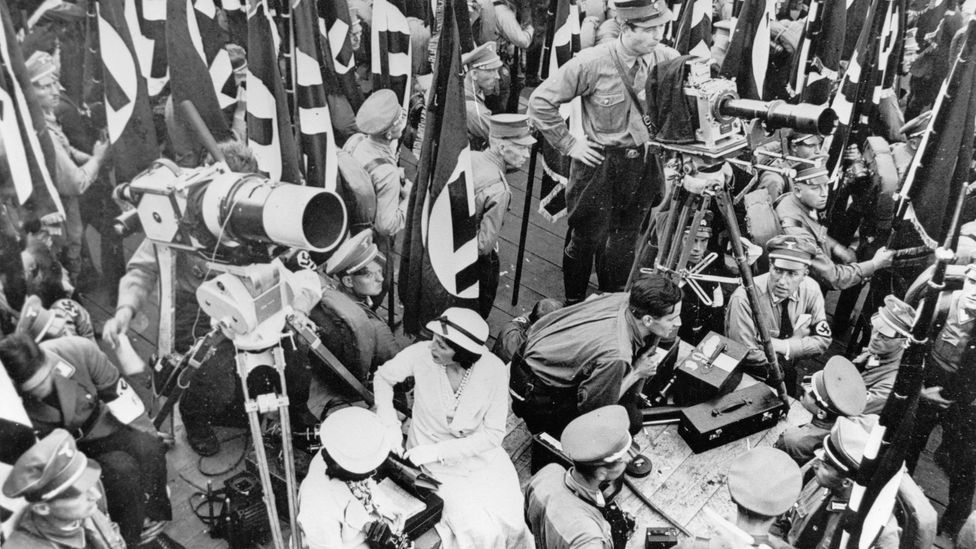
Riefenstahl had impressed Hitler with Triumph of the Will, a documentary of the 1934 Nazi Party Congress in Nuremberg (Credit: Alamy)
The film'south one glaring flaw is that she isn't very interested in the Games' competitive element. She doesn't build much tension over who is going to win any of the events. Her only business organisation is to brand them all uniquely cinematic, via slow-motion sequences, tracking shots, an astonishing number of unlike camera angles, and some extreme close-ups which were filmed afterwards and so spliced into the competition footage. This radical aesthetic approach culminates in a mesmeric loftier-diving montage shot by Hans Ertl. What begins every bit a straightforward record of the competitors' dives becomes more abstract and ecstatic until it is more like an aerial ballet, or a firework display. Riefenstahl even runs one segment backwards, so that a diver soars out of the water and into the air.
Whenever you start to exist hypnotised by Olympia, though, y'all are jolted dorsum to reality by a shot of Hitler, up in the stands, clapping and cheering when the Germans are doing well, drumming his fingers on his uniformed knee when they aren't. These aboveboard interludes, say Riefenstahl's detractors, were a concerted ploy to humanise a savage dictator. But it'due south an accusation that'due south impossible to bear witness. To the untrained eye, it just looks as if Hitler is beingness Hitler.

This video is no longer available
Too, in Riefenstahl's defense force, her representation of Owens is entirely positive. Repeatedly described by the commentator as "the fastest man in the world", Owens is shown not merely winning four gold medals, but beaming at the camera afterwards. No other athlete in the motion picture makes anywhere near as much of an impression. Nor is Owens the only black competitor to characteristic in Olympia. Knowing what we do about Nazi Federal republic of germany, the moving-picture show's obsession with race is troubling: the commentator notes that the line-upward in the 800-metre final has "two black runners against the strongest of the white race". But this fixation has its subversive aspect. The "black runners" – John Woodruff and Phil Edwards – finish the 800-metres in first and 3rd place. Information technology's hard to see how this sequence could have served the Nazi cause.
Game theory
As much equally Olympia glorifies Germany, it can just equally easily be read as a commemoration of multi-racial America. Over again and again, Riefenstahl focuses on a Us victory. And on two separate occasions, she superimposes a fluttering Stars and Stripes on a shot of a handsome, grin, American medal-winner. She may have wanted to print Hitler, only she also had her eye on a career in Hollywood.
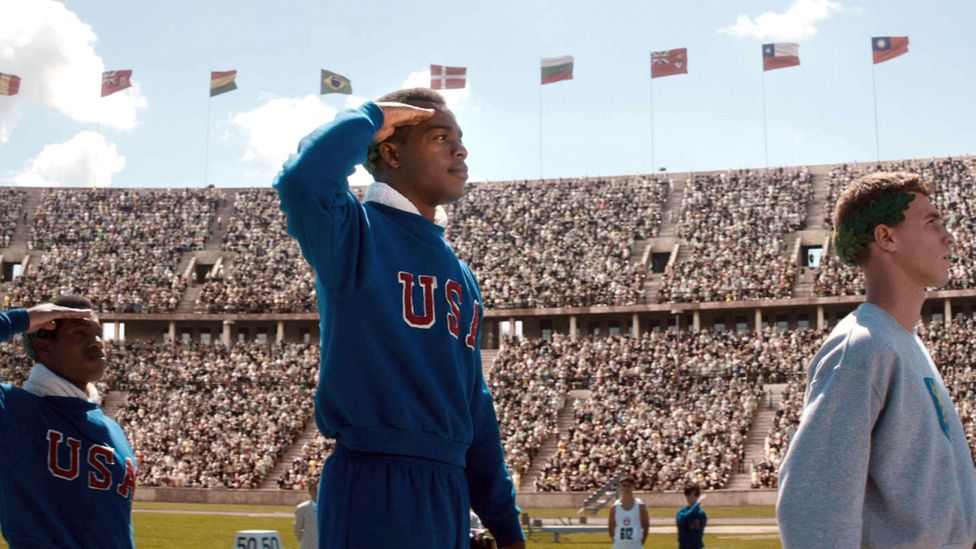
Stephen Hopkins' 2016 moving picture race dramatises moments from the 1936 Berlin Games – including Jesse Owens' victories (Credit: Alamy)
She didn't get one. Just afterwards Riefenstahl arrived in New York in November 1938 to promote Olympia, news of the Kristallnacht pogroms reached the U.s.: more than than one,000 synagogues throughout the Reich had been burnt in one night, thousands of Jewish businesses had been vandalised, and xxx,000 Jews had been taken to concentration camps. Later Riefenstahl declared to the American printing that she didn't believe these reports, no studio boss in Hollywood would come across her – the exception being Walt Disney. She returned to Germany, where she started piece of work on an epic drama, Lowlands, using Gypsy extras who, it was claimed in a 2002 lawsuit, were sent to Auschwitz once filming was finished. (The case was dropped when Riefenstahl retracted a public statement claiming all the extras had survived the War.)
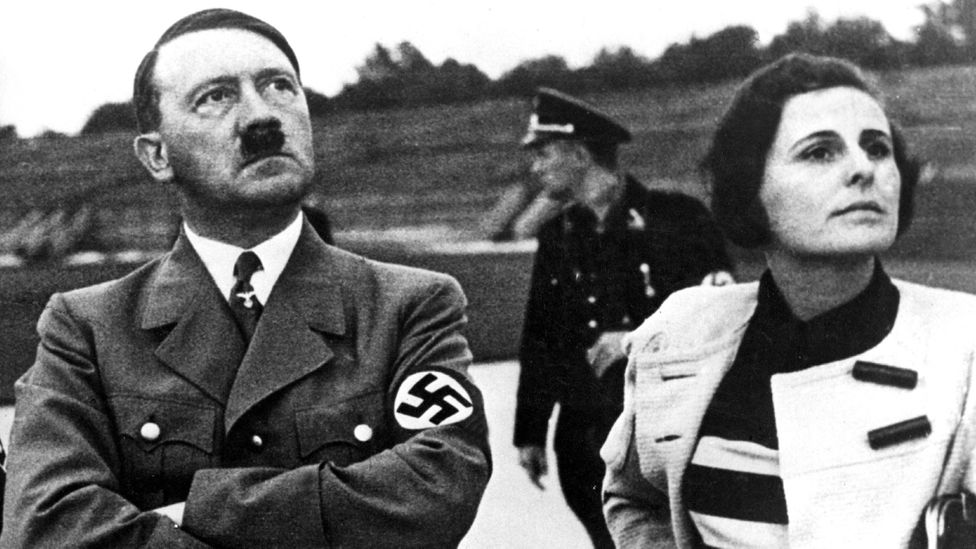
Riefenstahl's shut ties to the National Socialists – and Hitler in particular – haunted her for the rest of the life, but she remained adamant she was no Nazi (Credit: Alamy)
Riefenstahl's long life after 1945 was a strange i. She wasn't convicted of being a Nazi, and she regularly sued anyone who said otherwise, merely she couldn't launder off the stink of Hitler. Lauded every bit one of the greatest directors e'er to selection up a megaphone, she merely released one more movie, Underwater Impressions, in 2002.. She died a yr later, aged 101.
Riefenstahl'due south biographers have since come to agree that she had a closer relationship with Goebbels and Hitler than she liked to claim. But information technology would be incorrect to decry Olympia as a fundamentally Nazi pic. It isn't. In fact, its most Nazi-similar attributes are those which are intrinsic to the Olympics: the fetishising of concrete perfection, the evocation of a mythical aboriginal past, the division of the world into split up, competing, flag-waving countries. The uncomfortable truth is that Olympic imagery is never very far abroad from Nazi imagery, whether Riefenstahl is involved or not.
If you would similar to comment on this story or annihilation else you lot take seen on BBC Civilization, head over to our Facebook page or message us on Twitter .
And if you liked this story, sign up for the weekly bbc.com features newsletter , called "If You Simply Read six Things This Week". A handpicked option of stories from BBC Future, Earth, Culture, Capital, Travel and Autos, delivered to your inbox every Friday.
Source: https://www.bbc.com/culture/article/20160810-how-leni-riefenstahl-shaped-the-way-we-see-the-olympics
Postar um comentário for "If You See This Film Again Today You Ascertain"